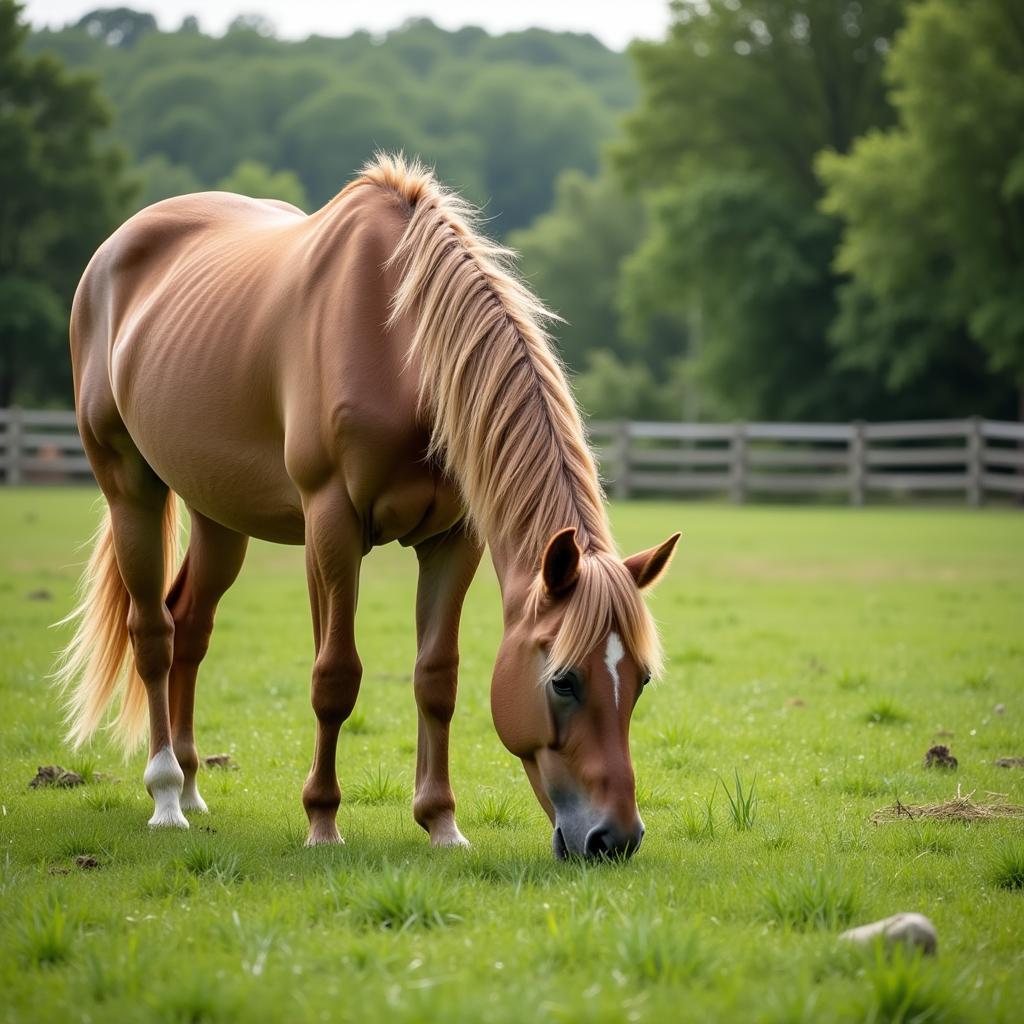When a beloved horse reaches the end of its life, the decisions surrounding their passing can be incredibly difficult. It’s a sensitive subject that every horse owner will likely face at some point. One aspect of this process is understanding Horse Disposal Services and choosing the option that aligns best with your personal beliefs, location, and budget.
 Peaceful Passing: A horse grazing in a serene pasture
Peaceful Passing: A horse grazing in a serene pasture
Navigating the Options for Horse Disposal
There are several ways to respectfully handle the remains of your horse. Let’s explore the most common methods:
1. Burial: A Traditional Farewell
Burying your horse on your own property offers a sense of peace and closure. However, this option requires sufficient land, adherence to local regulations regarding livestock burial, and the physical capacity to excavate a grave deep enough to comply with sanitary standards.
Expert Insight: “Many people find comfort in burying their horses on their own land,” says Dr. Emily Carter, veterinarian and equine specialist. “It allows them to create a lasting memorial in a place that holds special meaning.”
2. Cremation: A Dignified Choice
Equine cremation offers a respectful and hygienic method of handling horse remains. There are two types:
- Individual Cremation: Your horse is cremated alone, allowing for the return of ashes in an urn.
- Communal Cremation: Your horse is cremated with other animals, and ashes are not returned.
Expert Insight: “Cremation is often chosen for its efficiency and respectful handling of the animal,” explains Dr. Carter. “Individual cremation offers a tangible way to remember your horse, while communal cremation provides a dignified option without the need for ashes.”
3. Rendering: A Practical Solution
Rendering involves the processing of animal remains into usable byproducts, primarily used in industrial applications. While not a traditional choice for many, it’s a practical option that helps prevent the spread of disease.
Expert Insight: “Rendering plays a crucial role in disease control and waste management within the agricultural industry,” notes Dr. Carter. “It might not be the most sentimental choice, but it’s a practical solution for some horse owners.”
 Support System: A horse owner seeks solace from a veterinarian
Support System: A horse owner seeks solace from a veterinarian
Factors to Consider When Choosing Horse Disposal Services
Several factors influence the decision-making process:
- Legalities: Local ordinances and regulations often dictate allowable methods of animal disposal. Contact your local authorities or a veterinarian for guidance.
- Financial Resources: Each method comes with varying costs. Consider your budget and explore available options within your price range.
- Personal Beliefs: Your personal beliefs and values play a significant role in choosing the most appropriate method.
- Logistics: The location of your property, accessibility for heavy machinery (if burial is chosen), and proximity to service providers all contribute to the decision.
Finding Reputable Horse Disposal Services
Navigating the loss of a horse is emotionally challenging. Seeking support from fellow equestrians and experienced professionals can provide comfort and guidance:
- Consult Your Veterinarian: Your veterinarian is a valuable resource for information and referrals to reputable horse disposal services.
- Contact Local Equine Organizations: Horse rescue organizations, riding stables, and equestrian clubs often have knowledge of local service providers.
- Research Online: Look for online directories or reviews of horse disposal services in your area.
Frequently Asked Questions
What is the average cost of horse disposal?
Costs vary depending on location, chosen method, and additional services (such as transportation). On average, burial can range from a few hundred dollars to over a thousand, while cremation costs typically fall between $200-$700.
Can I bury my horse on my property?
It depends on local regulations. Contact your county or city government to inquire about livestock burial ordinances.
How long does it take to arrange for horse disposal?
Contact service providers as soon as possible, as response times may vary. Be prepared to provide essential information about your horse and your location.
Exploring Further Resources
For information on horse farms in New Jersey for sale, visit our dedicated page: horse farms in new jersey for sale.
Need Assistance? We’re Here to Help
Losing a cherished horse is never easy. If you need support or guidance during this difficult time, don’t hesitate to reach out. Contact Justus Horses USA at 0772127271, email us at [email protected], or visit us at QGM2+WX2, Vị Trung, Vị Thuỷ, Hậu Giang, Việt Nam. Our compassionate team is available 24/7 to answer your questions and offer support.